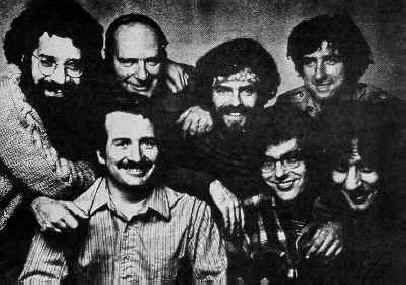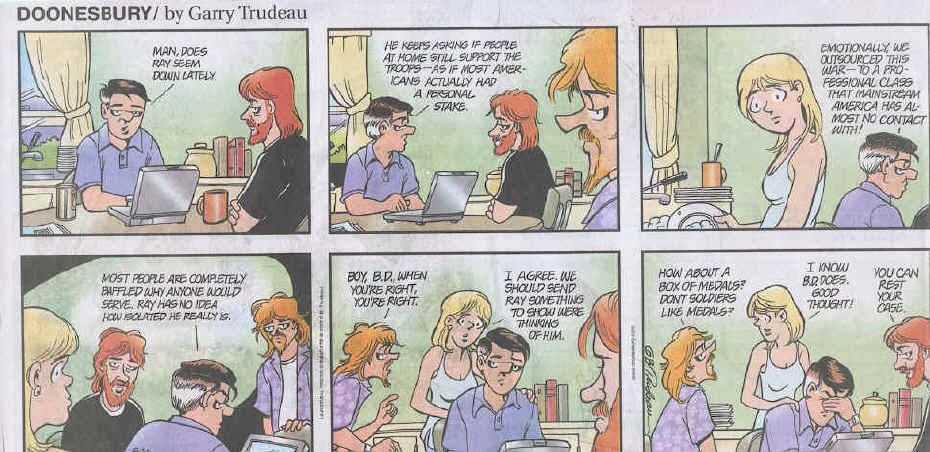Editor's Note: In 2007, most Americans are simultaneously opposed to the war in Iraq and totally uninterested in doing anything about it. This is especially true among young people. Is it because we have, as the Doonesbury comic strip put it, “outsourced this war to a professional class that mainstream America has almost no contact with”? In addition to running in the Stamford Advocate and the Greenwich Time, during the week of September 26, 2007, this article was posted on the Web site of Minuteman.org, a progressive source of syndicated editorials in Fairfield County, run by a former mayor of Norwalk, CT, Bill Collins. From there, it was picked by newspapers across the country, including such Red States as Arkansas and Texas.
The Draft: An Idea Whose Time Has Come
President Bush continues to insist that he heeds his generals’ counsel on military matters. Nonetheless, no one is surprised by his lack of enthusiasm for a recent suggestion from Gen. Douglas Lute, his War Czar, that “it makes sense to certainly consider” reinstating the draft.
Like many of the ideas rejected by this administration, the draft may be one whose time has come. This isn’t solely because neocon mismanagement has broken the U.S. military, which desperately needs the manpower. Nor is it because more-diverse armed forces would result in a lower percentage of poor and minorities dying in Iraq, as asserted by N.Y. Congressman Charles Rangel.
Nor is it because we’ll need to “either pull back on our global commitments or increase our military force,” as newsman Dan Rather has warned. The most-important argument for a draft is that it might engage the American people, whom this administration has deliberately insulated from the effects of its foreign policy.
Mr. Bush has largely had a free hand in the war on terror, because the public has been shielded from most of its consequences, including the body bags returning from Iraq. The Republicans have even taken the unprecedented step of cutting taxes while spending $500 billion to invade and occupy Afghanistan and Iraq.
Although most Americans have turned against the Iraq war, we’ve shown little interest in actively opposing it, and our apathy has infected the politicians we elected in 2006 to end it. House Speaker Nancy Pelosi’s brain may be telling her to resist GOP excesses, but her heart’s not in the right place — it’s set on increasing her slim Democratic majority. Our spineless Congress has shown no inclination to cut off funding for the occupation and didn’t even put up a fight over warrantless wiretaps.
Forty years ago, Americans were polarized by the Vietnam war. The country was awash in political dissent, especially on college campuses, which were hotbeds of the peace movement. In terms of sheer numbers, the populace was probably less antiwar in 1968 than it is today, but there was far more activism.
Why such pervasive apathy in 2007? One major factor is our all-volunteer army, which enables most of us to feel totally disconnected from the actions of our military.
During the Vietnam era, the draft directly affected young people, as well as their parents, involving a sizable percentage of ordinary American families. In 1970, my father hoped I’d be drafted, because military service might make a man out of me. But once my draft lottery number (# 22) was selected, my mother wanted Dad to keep me out of Vietnam by slicing off one of my toes with his table saw.
 |
The apathy of today’s young people compares unfavorably with the activism of college students during the ’60s, but the moral implications of this are dubious. The liberal activists of the ’60s eventually became the balding yuppies who elected George Bush twice and cheered the invasion of Iraq. (In any era, most of us can be easily convinced to support any war our president wants to start … at least in the beginning.) |
Aging baby boomers love to talk about how “back in the day” we were “committed to causes” and how “kids these days are going to hell in a hand basket” and all that “Big Chill” stuff. But mostly it’s just hot air.
Without the draft hanging over our heads like the sword of Damocles, most of us would have spent the ’60s ignoring Vietnam, smoking dope and listening to the Grateful Dead. Support for the antiwar movement — and the myriad causes championed by college kids at the time — was a mile wide and a half-inch deep, and it evaporated quickly enough once the draft ended in ’73.
Teenagers of any generation are self-absorbed, self-interested conformists who are afraid of being different. Even those who disapprove of the Iraq war have little incentive to pull themselves away from their cell phones and iPods and get excited about something that isn’t likely to affect them directly.
Been to any Moveon.org meetings lately? They’re as geriatric as the protesters shouting “Bring Home the Troops” on street corners. And a good percentage of the left-wing blogosphere that’s so apoplectic about the war is made up of graying boomers looking for things to do now that the kids have finally gotten married and moved out.
But college students — and their parents — might be roused from their lethargy by a draft. Let this generation of teenagers spend their 18th birthdays worrying about their draft numbers, like we did, and they might start singing a different tune — perhaps something from the Jefferson Airplane catalog.
The best way to arouse the apathetic about government policies is to make them realize that those policies could result in Muslim holy warriors shooting at them. We need a draft, because — as the 1776 Revolution should have taught us — angry Americans are better Americans.

Click here to return to the Mark Drought home page.